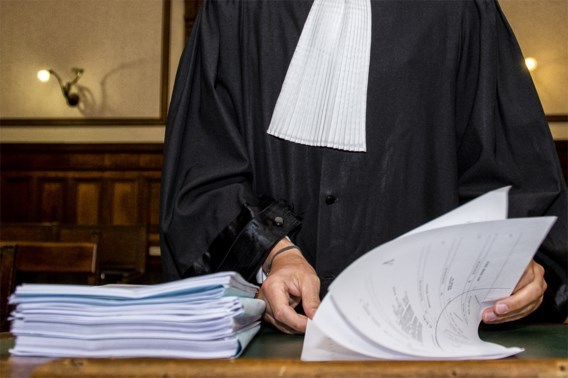Belgium's legal system is "clearly behind" other countries in the race to adopt artificial intelligence (AI) technologies, and it is time to establish a strategy for how it can be used by the courts, according to a top official.
Luc Vermeire, Auditor General at the Council of State (one of Belgium's highest courts), says that as major law firms in Brussels are already using AI to work more efficiently, "we should really start to think about what we [the Belgian courts] are going to do with it."
Belgium's Council of State is the country's highest administrative court, and deals with disputes about how government bodies administer their powers, as well as giving advice to government on draft laws and decrees.
As Auditor General, Vermeire and his team prepare the files for cases that come before the Council of State. Auditors share their opinions during oral hearings of cases and debates about draft legislation, before a final ruling is made by the judge.
Vermeire believes that using AI could help to alleviate pressure on Belgium's overburdened court system, which is leaving staff spread too thin and litigants waiting years for a decision.
"It could help to solve certain issues. We could have artificial intelligence summarising judgments, so people who are doing that now can work on other areas," he said, adding that the use of chatbots such as ChatGPT could also be helpful.
AI embraced by other judiciaries
The European Commission for the Efficiency of Justice (CEPEJ) has already set out ethical guidelines for the use of AI in judicial systems.
Although Vermeire emphasises that AI will probably never replace judges altogether, he says that the technology is not going away, and is already being used by some judiciaries.
Earlier this month, headlines broke in the Netherlands about a judge using ChatGPT in a verdict for the first time (or at least, it was the first time the use of ChatGPT was transparently disclosed in an official judgment).
As AI and algorithms are increasingly being used as tools in decision making, Vermeire says it is time for the Belgium's government, parliament and judiciary to come together and start thinking about how it could be used by judges and court staff.
Potential dangers
However, he also warns that Belgium must be "careful" about how AI is used in the legal system, as there is potential for the technology to cause more harm than good.
"With AI, you get bad results if you use bad data," he said. "If you introduced data about all the members of all the past Council of State's in the Netherlands, and asked what are the conditions to become a judge in the Council of State, one would be 'to not be female' – and the same thing would be true in Belgium."
Vermeire also highlights the possible dangers in using AI to analyse past decisions of a particular court or judge, and trying to predict future outcomes.
"Some people ask if that is a good idea or not. For example, if you have [legal expenses] insurance and you want to sue someone or start a case, but your insurance company has examined all judgments, maybe on the basis of the name of the judge, and decides you do not have a case," he said.
He added that the use of AI as a technology that feeds on existing data to make decisions and predictions could also limit changes to case law. "Often a party comes [to a case] with new arguments, but if you have a system that makes that more difficult, it could be dangerous."

The Palais de Justice in Brussels. The eclectic and neoclassical style building serves as the headquarters of several important law courts.
Courts calling for modernisation
In July, officials from Belgium's top three courts (the Council of State as well as the Constitutional Court and Court of Cassation) issued a joint memorandum, sounding the alarm on key concerns for the judiciary which they say pose a threat to the rule of law in Belgium.
Among them was the need for the judicial system to modernise and adopt new technologies, including embracing AI as well as computerising documents to make them more accessible to the public.
While the courts have advanced from the entirely paper-based system when Vermeire first started working for the Council of State in 1996, he says the majority of documents from Belgium's various courts are still difficult for the public to access without a lawyer.
"For a citizen to apply the law or respect the law, they have to be able to know the law. To have trust in a judgment, you have to be able to read the judgment. That's one thing that we ask, that it [case law] should be more accessible," he said.
'Not Poland or Hungary', but still risks to rule of law
The memorandum from the country's top courts points out a number of other threats to the rule of law in Belgium (the rule of law being the idea that nobody, not even the State, is above the law).
"We are not like Poland or Hungary, but sometimes you see certain small things which are not a good idea. It is important to draw the attention of the new government, to say that justice is important and the rule of law is important," said Vermeire.
Their concerns include an urgent need for more funding and resources for the judiciary, closely linked to the State's duty to process cases within a reasonable amount of time.
Related News
- 'Drag on for years': Belgium again called on to speed up court cases
- 'Make people think twice': How AI images could help solve cold cases in Belgium
- EU highlights 'serious concerns' for rule of law in Belgium, but progress since 2023
"There is always the demand, and it's understandable: we must deliver good justice as quickly as possible. This is sometimes difficult and requires sufficient staff and judges," Vermeire explained. "To treat cases quicker, we would need almost 40% more judges."
Demands for more resources for Belgium's courts come as the incoming government is scrambling to shave its budget down by €28 billion over the next four to seven years, after being called out by EU regulators for excessive overspending and public debt.
Court decisions falling on deaf ears
Another concern which the Belgian courts have deemed "unacceptable" is the government's failure to comply with rulings from the Belgian judiciary as well as international courts.
Belgium has been condemned on numerous occasions for not implementing judgments, including thousands of cases where the State has failed to provide shelter to asylum seekers. In July, EU regulators outlined "serious concerns" about Belgium's lack of compliance with rulings in their annual Rule of Law Report.
"If you expect ordinary citizens to respect judgements, then maybe you [the government] could also. We know that it is not possible to solve issues within two months or six months, but you should address the issue; it is not going to go away automatically," said Vermeire. "Everyone is entitled to human treatment; it's a fundamental right of everyone and we have to respect that."

